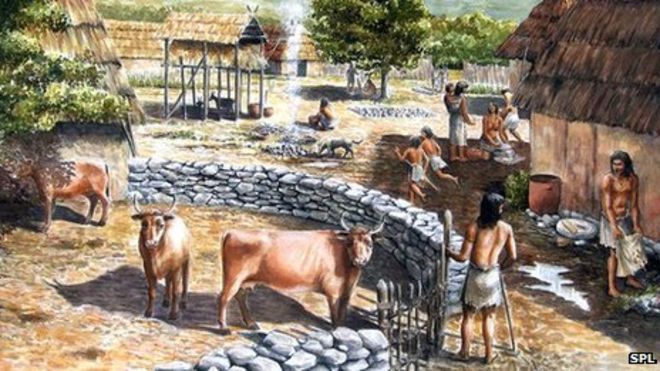The Paleolithic Era began nearly two hundred thousand years ago, and lasted for tens of thousands of years. The Neolithic Era followed, and was introduced with the rise of plant and animal domestications between twelve and six thousand years ago. The thought of the human species being around for so long is interesting to think about, especially given the fact that humans originated from ancestors in East Africa that date four to five million years back.1 Our ancestors must have been doing something right, considering the fact that the human species survived for such a long time without the technology, medicine, and overall knowledge that we have today. Once we realize that our ancestors from two hundred thousand years ago were so successful in their pattern of living during the Paleolithic Era, we must ask ourselves what changes occurred during the transitional period between the Paleolithic and Neolithic Eras, and whether or not those changes were good.
Humans living during the Paleolithic Era lived in egalitarian societies, that is, societies in which the inhabitants practiced political, economic, and social equality, where each individual in society held the same social status as all other members of society. This egalitarian society was made possible because of their way of life at the time. People lived in small communities of no more than a hundred, and they relied on hunting and gathering as their means of sustenance. They were necessarily migratory because of the limits of their environment, so there was not a real possibility of staying in one place for an extended period of time. Their migratory existence made the accumulate wealth impossible; in fact, wealth was an inconceivable concept for hunters and gatherers. As a result, everyone in society had the same economic standing; since there were no economic differences among individuals of society, there were no social classes. Nor was there the formation of political classes during this time either. Furthermore, everyone—men and women alike—played relatively equal roles in contributing to the survival and well-being of the community.2
This way of life and the egalitarian nature of society remained intact for centuries after the beginning of domestications. However, as hunter and gatherer societies transitioned to herding and farming, and hence to a sedentary lifestyle, a shift began that transformed those societies from egalitarian to stratified societies.3 This shift is one of the major distinctions between the Paleolithic and Neolithic Eras; again, this shift is a direct result of plant and animal domestication, or herding of animals and agriculture.

Agriculture gave the people of the Neolithic Era reassurance that their food supply would be constant; however, it also caused the rise of new issues that communities in the Paleolithic Era never dealt with. For example, the rise of agriculture prompted humans of the time to live in clustered societies, and therefore fostered the spread of parasites and several infectious diseases.4 Furthermore, since agriculture promoted a sedentary lifestyle, Neolithic societies were enabled to accumulate wealth in the form of surplus food supplies. This accumulation of wealth allowed for the social structure of the Neolithic Era to quickly become vastly different from that of the Paleolithic Era due to a focus on the “interests, behavior, and social role(s) of individuals versus a collective group of individuals.”5
Essentially, in the transition between the Paleolithic and Neolithic Eras, human society suffered a loss of social and economic equality and a general respect for all people, and replaced it with a system that required the separation of people based on superficial characteristics such as wealth, power, and gender. The interesting thing about the new class and gender distinctions that accompanied the beginning of the Neolithic Era is that for hundreds upon thousands of years, the human species had managed to exist without the use of class separations. Instead, it was the common practice of communities during the Paleolithic Era that there was no need to cause separation between persons because everyone made an equal contribution to the development and management of their small communities. Ironically, during the Neolithic Era, the rise of agriculture allowed the development of class divisions, as well as the establishment of governments that ruled harshly over society’s non-elites.6
These changes in social structure that arose during the Neolithic Era as a result of agriculture still persist in our societies today; there are still deep and widespread class divisions; there is still gender inequality, and there is still a sense of excessive elite control over the working class.7 Overall, social changes that occurred during the transition between the Paleolithic and Neolithic Eras exhibited a loss in important practices that we have only recently attempted to restore.
- Jerry H. Bentley, Herbert F. Ziegler, and Heather E. Streets-Salter, Traditions & Encounters: A Brief Global History From the Beginning to 1500, Fourth, vol. 1 (McGraw-Hill Education, 2016), 6-7. ↵
- Bentley, Ziegler, and Streets-Salter, Traditions & Encounters, 6-7. ↵
- Bentley, Ziegler, and Streets-Salter, Traditions & Encounters, 7-8. ↵
- Jared Diamond, “The Worst Mistake in the History of the Human Race,” Discover Magazine, May 1987, 65. ↵
- Ian Kuijt, Life in Neolithic Farming Communities: Social Organization, Identity, and Differentiation (New York: Springer Science & Business Media, 2002), 315-316. ↵
- Jared Diamond, “The Worst Mistake in the History of the Human Race”, 65. ↵
- Jared Diamond, “The Worst Mistake in the History of the Human Race.”, 65-66. ↵



59 comments
Gabriela Serrato
It is very interesting to think of the past ways of humans, and how we have evolved so much to what we are today. This article was very informative and I learned many things. I found it striking that old societies were egalitarian, as everyone was on the same status. This makes me think of just how must time has passed, as social ranking has been around for an incredible time as well. It is interesting that this division was introduced through agriculture, as it provided a way to keep societies in one spot for long periods.
Jennifer Pogue
Great article. It is very sad how materialistic all humans are by nature, and that we truly have to put in great effort to become less materialistic. Because land meant wealth and power, people had something to fight over. It reminds me of the movie The God’s Must be Crazy, where there was a non-developed aborigine clan that was very peaceful and never was jealous, until a coke bottle fell from a plane and they all started to fight over who had the coke bottle. The love/obsession of wealth and earthly possessions ruins the hearts of humans.
Lianna Ybarra
I really liked this article! I think it’s so cool how during the Paleolithic Era didn’t have any societal rank, classification, or status. I wonder what it would be like to live in a world like that. You can tell just from the transition to one era to the next, values and the way of life gets lost. I feel like that’s also how it is still now. We go from one generation to the next and new things are up and coming and old ways get lost in transition. Overall, awesome job on the article!!
Zaraly Frasquillo
This article made me question who I was as a human and whether at some point “history will repeat itself” and we might have to go back to how life was before. I think you did an amazing job in making your article flow very smoothly. I also loved how there was so much information but reading the article did not feel dreadful and long. It was actually super easy to read! Great job, the images were great too!
Mario De Leon
This was a fun article to read. I did not know a lot about the Paleolithic or the Neolithic Eras but this article was very informative. I find it interesting that men and women played relatively equal roles. And it is sad to think that I the transition between eras humans lost gender equality. It is like we downgraded instead of upgraded. I also think it’s interesting to think that today’s class separation started with this transition.
Briana Bustamante
I really enjoyed reading this article. It was very informative and I also liked the different perspectives that you Incorporated. I was unaware that the social class system was born from agriculture and domestication of animals! I wish we could see people as equal as we once did. If so, then there would be less hate and segregation in this world. Over all great article!
Gabriela Medrano
What it would be like to live in those times we can only imagine, where all were treated as equals and there was no form of wealth mobility. What a process it was to reach a distinction amongst the whole human race, but topics like these often raise questions and doubt since it dates so far back. Everything seemed to happen naturally, society shaped itself through the domestication of plants and animals. Your style of writing was formal and well suited your topic, well done.
Cameron Mays
This article is quite exceptional because it provides us with a question we must ask ourselves: are we really living as best as humans can live? In our lives are these large communities where we rely on others to have certain traits the best, or should we become more well-rounded and deal with all of our issues by ourselves? Simply because of this I rate your article highly, it’s also quite well-written.
Erik Rodriguez
This article is very informative and well researched! I couldn’t imagine living in an era like that! However, it is intersting to note that it is because of all this domestication and agriculture that social classes were born.
Very well written, great article!
Jacob Hall
this is a very good article. It never accrued to me that the societies of mankind were born from the ability to rise agriculture. By doing this humans were prompted to live in clustered societies. Also what i found interesting was that what caused people to advance was also the the thing that harmed them, by having illnesses and parasites spread across the newly formed societies.